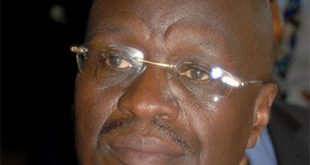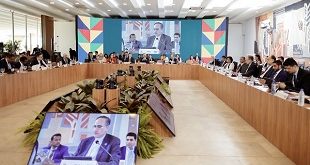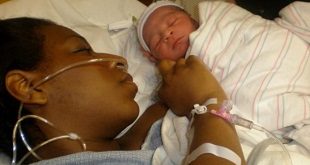
By Flavia Nassaka
Global Fund CCM says there’s low absorption, Ministry says all is well
On Feb.01, the Ministry of Health released yet another statement on malaria outbreak in Northern Uganda saying the number of people testing positive for severe malaria was increasing again. According to the statement, malaria had claimed 658 people and affected over a million others since July 2015 when the disease first broke out.
Also, since September 2015 people living with HIV/AIDS have been struggling to get their daily doses of Anti-Retroviral drugs (ARVs) as health centers across the country are reporting drug stock outs.
But as this is happening, the country is allegedly failing to spend US$ 421 million (about Shs.1.4 trillion) from the Global Fund, an international organisation financing HIV/Aids, Malaria and Tuberculosis activities in developing countries. The bulk of this money, 95%, is meant to buy commodities, including drugs and other requirements and the rest to pay for some ministry of Health activities in the country operations.

The resources under scrutiny were released in July 2015 but have up to now allegedly not been used. They include the initial grants worth US$226 million comprising US$176 million for HIV, US$14 million for strengthening health systems, US$22 million for tuberculosis, and $14 million for malaria.
With the donor money, it was anticipated that ARVs coverage will increase to 69% of people living with HIV by 2017, prevention of Mother-to-Child Transmission of HIV will be increased from 85% to 90% by end of 2016, and people with TB tested for HIV and ART given to the co-infected.
So far, experts say, there’s no visible evidence that the grant is fulfilling its purpose. Only half of the 1.5 million who need HIV treatment get it and people in the 10 most affected districts by malaria are still grappling with the disease.
40% not absorbed
Dr. Vinand Nantulya, the Chairman of the Global Fund Uganda Country Coordinating Mechanism (CCM), a board that monitors and oversees whether global fund money is being utilised as intended, says some of the money is lying idle.
“Over 40% of the money is not absorbed,” he said in an interview, “It means the services that are intended to be delivered to the people are not delivered”.
He said as a result, Uganda has been listed among 20 countries that are not utilizing the Global Fund money adequately.
Nantulya who doubles as the Chairman, Uganda AIDS Commission (UAC) says, under new Global Fund directives, a new non- cash model has been introduced where the Fund procures commodities on behalf of countries and distribution is made by both private and public institutions.
He said implementation of activities and distribution of Global Fund commodities and resources is done by the Ministry of Finance, Ministry of Health, and The AIDs Support Organization (TASO). This was partly meant to reduce the challenges countries face with this money. In Uganda this was meant to avoid a repeat of problems experienced previously.
In 2005, the Global Fund cut-off support to Uganda over allegations of corruption and misappropriation of money. Alice Kaboyo, a former State House employee, then-Health Minister Jim Muhwezi, and his deputies Dr Alex Kamugisha and Mike Mukula were among those charged in connection with misappropriation. Some of them were acquitted.
Also, in 2005, an audit revealed graft and led to brief suspension of five grants by the Fund. Two years later, in 2007, the Global Fund again withheld US$16 million on grounds of poor performance and misappropriation of money.
Nantulya said the Fund based on that bad history to change from giving money directly to the government and channeling it to Non-Governmental Organisations (NGOs) and countries. He says, however, this has introduced its own challenges.
Fear of a repeat of 2005
“The Global Fund policy is simple. You got the money, show us how you’ve used it to deliver the services,” Nantulya said, “What we do to a country that doesn’t absorb the money is that we get that money and give it to those who can absorb it.”
Nantulya said Global Fund will not withdraw from Uganda because officials from the country have been “talking’ to them”. He said a team from the Fund headquarters in Geneva, Switzerland was recently in the country to discuss the country’s poor performance.
He said it is worrying that development partners can pull out at any time yet 70% of the health activities in the country are financed by donors. The government caters for only 10% whereas 20% health financing is done by individuals.
When contacted for comment, Dr. Jim Arinaitwe, the Coordinator of Global Fund at the Ministry of Health, said the allegations of under utilization of resources were false.
“The grants are doing well but people are exaggerating it. We are only two quarters into the grant. We expect as we move on there is going to be more focus on in country operations,” he told The Independent on Feb. 05.
He added: “The money they are clamouring for relates to about $32 million within the grant for operations to support implementers to engage sub-recipients, do life skills, and establish youth friendly corners in the hospitals.”
He said Uganda has so far received funds for Quarter 1 and Quarter 2. But with the outbreaks and the World Health Organisation guideline to enroll more people on treatment, they informed the donors who approved their move to front load commodities in order not to disrupt treatment.
“The HIV grant, for instance, is supposed to be used within a period of three years but because of increased consumption, all commodities for year one have been consumed. We have even front loaded commodities for year two into year one,” he told The Independent.
While the HIV grant was scheduled to last until 2017, Arinaitwe says the commodities available will only take the programme up to September 2016. He said there is need to mobilise additional resources to cover the gap in 2017.
He said commodities to cater for malaria in the first year of the grant have been distributed and they have frontloaded those for year 2 to cater for the outbreak in Northern Uganda which put a strain on the supplies and required additional diagnostics and medicine for both ordinary and severe malaria encroaching on portfolio for treatment.
“We are lobbying government to increase domestic financing. They are adding an additional $92 million to cover the period 2016/2017 which was supposed to be covered by the donors for the drugs,” he said.
According to Arinaitwe, Shs50 billion will be given to the National Medical Stores (NMS). According to the Budget Framework Paper for 2016/2017, the NMS budget has remained the same as last financial year at Shs218 billion.
Arinaitwe said donors are keen on whatever happens with the Fund resources in the country, however small, because Uganda has had a set back and it takes time to rebuild confidence. He said the Global Fund resolved not to suspend funding but punish implicated implementers.
TASO explains delays
Dick Muhwezi, the Project Coordinator Grants Management Unit at TASO said they have delayed but awarding contracts to sub-recipients is going on and that it should not be seen as an emergency situation yet.
TASO is supposed to ensure that CSOs sensitise people, community groups, and leaders to reform harmful gender-based and socially discriminatory practices that hinder access to health services by vulnerable groups. These include pregnant women, prostitutes, and the youth.
For this, TASO received US$7.8 million in July 2015. Muhwezi said TASO retains US$2.47million and US$5.4million is supposed to go to six sub recipients. He said TASO is currently awarding contracts to sub-recipients who will distribute commodities and engage other CSOs on their behalf.
Muhwezi said this exercise was late because TASO needed “to balance distribution programmatically and geographically.
“It took some time to reach consensus on how to divide the country. We got 97 applications for 6 positions for implementing activities. When we finally start implementing, we don’t want to hit unforeseen obstacles.”
Muhwezi said TASO also had difficulty in recruiting experts for specialty activities. As part of the grant, Arinaitwe says a new warehouse for NMS is being built at Kajjansi off the Entebbe-Kampala highway. Upon completion, they will install a computerised system for logistics management and enterprise resource planning equipment. Under HIV, the grant covers prevention programmes for people at higher risk of infection, adolescents and
 The Independent Uganda: You get the Truth we Pay the Price
The Independent Uganda: You get the Truth we Pay the Price



